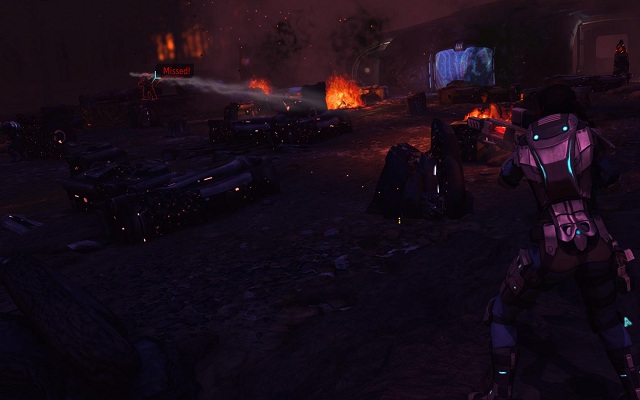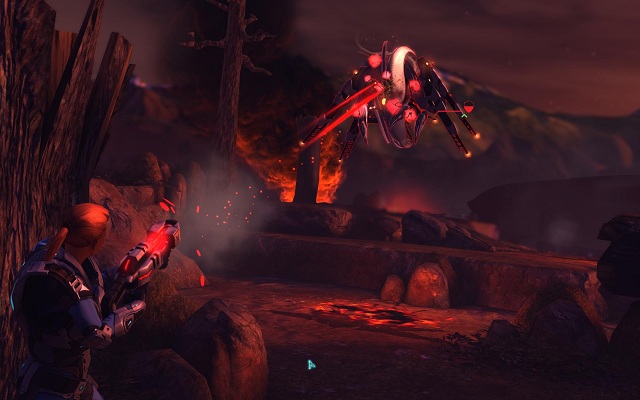The X-Com series is unlike anything you’ve ever played before. Like a matryoshka doll, these strategy titles are a game within a game. And then within these, you’ll find layers upon layers of complexity and depth. Sure, some games are like some parts of X-Com, and yet others are like different parts of X-Com. But nothing is quite like the whole shebang.
Codenamed X-Com, for Extraterrestrial Combat, the clandestine paramilitary organization needs a leader. Should you accept this mission, you’ll oversee operations at every juncture, from the large-scale strategic view of stopping an alien invasion of the entire planet down to the tactical level of turn-by-turn skirmishes of small squads fighting on the front lines. You’ll direct research, decide what equipment to manufacture, maintain an international coalition against the encroaching Martian threat, and build the facilities to make all of this possible.
While managing all of this, you need to please the nations of the world funding this international initiative. Fail too much and too often and countries slowly drop out of the program until you’re unable to continue. That’s a lot of pressure.
The original X-Com: UFO Defense came out almost 20 years ago. We haven’t seen anything remotely similar and worthwhile since series creators Julian and Nick Gollop finished their own follow up, X-Com: Apocalypse, in 1997. Tomorrow, Maryland developer Firaxis (built from remnants of publisher/developer Microprose, the company that handled the original games) picks up the reins with its reimagined (and alternatively titled) XCOM: Enemy Unknown, which releases for the PC, PlayStation 3, and Xbox 360.
WHAT YOU’LL LIKE
Enemy Unknown has a lot of character, including a deep appreciation for its source material and UFO mythology. Its design succeeds in ways that should give other developers cause to take notice.

Is that your final decision, sir?
Enemy Unknown is all about making choices, and the outcomes are not always so obvious. This follows the ideas from game designer Keith Burgun (100 Rogues, Auro), who argues that decisions are not really decisions unless they are also “ambiguous.” In other words, if a particular problem has an obvious solution, you’re always going to pick that best option. You weren’t really given a choice.
You’ll make many of your decisions in Enemy Unknown during the turn-based, tactical portion of the game, where you’ll lead a squad of up to six individual soldiers against an unknown number of menacing alien scum.
Positioning your troops behind cover is vitally important to their survival. Because of fog of war (a mechanic that obscures parts of the map outside your units’ visible range), the choice is one you must sometimes make without complete information — you won’t always know the location of your enemies. If you happen to place a warrior on the wrong side of a tree, the enemy could flank him, which provides a significant combat bonus to the attacker. Making such bad calls can have serious, permanent consequences because when soldiers die, that’s it.
In the strategy component of Enemy Unknown, where everything plays out in real time, you have several different goals competing for the same resources. You’ll only receive so much funding per month from The Council, a collective of 16 nations that make the XCOM initiative possible, and you won’t be able to do everything you want all at once. Should you put money into developing new equipment for your squad, or would the XCOM organization be better off with an additional Satellite Uplink to increase its capability to monitor the skies?
These decisions have a permanence to them as well. The tactical combat portion of Enemy Unknown uses a two-action system, where soldiers can either move twice, move once and perform an action (such as shooting, using an item, or going into “Overwatch,” which is just a fancy term for reaction fire during the enemy’s turn), or perform a single action. Although a couple of skills let you bend the rules here, this is essentially how the system works. And this means that once you right-click a square on the grid-based map to order a unit to that location, you can’t take it back … even if you spot a previously unseen foe on the way there.
[vb_gallery id=546678]
In the strategy layer, you’ll routinely deal with reports of alien abductions from around the globe. These always come in groups of three, and you’ll only ever able to visit a single site. No matter what happens on the mission you choose, the rest will negatively affect XCOM’s performance rating for those nations that you decide to ignore. And sometimes, though not too often, your satellites might spot a UFO in the skies while you’re readying your strike team.
Enemy Unknown goes further and employs Ironman Mode, which autosaves the game every turn in a single slot. Playing in this fashion makes all of your decisions especially meaningful because you can’t engage in save scumming — as Burgun wrote in his article, “If you can reload after making a bad choice, then that choice gets no chance to have effects on the game.” Unfortunately, playing Ironman is only an option, and I wish Firaxis had had the fortitude to go all the way, like developer From Software has done with the Souls games.
But like the original, Enemy Unknown gives all your decisions the necessary context to make them meaningful. Firaxis calls it The Council.
“We’ll be watching you”
That would be The Council, who will sinisterly relay this message from time to time, and the judgment of this international body ties together everything else in your charge. At the end of each month, they score your performance, noting the number of alien abductions, UFOs shot down or raided, research projects completed, or any other mission-critical milestones. Your successes and failures ultimately decide whether they’ll keep the cash flowing.
Each country has a panic rating, and if any reach red on the scale, you’ll have until the end of the month to calm everyone down. That could mean launching a satellite over a nation’s airspace, recovering a crashed UFO in the region, or completing a Council-mandated mission.
Failing to satisfy these nations means that they’ll withdraw from the XCOM project all together, which then results in you losing out on bonuses earned by providing full satellite coverage for an entire continent, such as Asia’s “Future Combat” that drops the cost of projects in the Foundry and upgrades in the Officer Training School by 50 percent. Lose half of The Council and it’s game over.
Without this, you’d have no incentive to consistently perform well. The Council makes every engagement feel dire and lends urgency to every decision.

